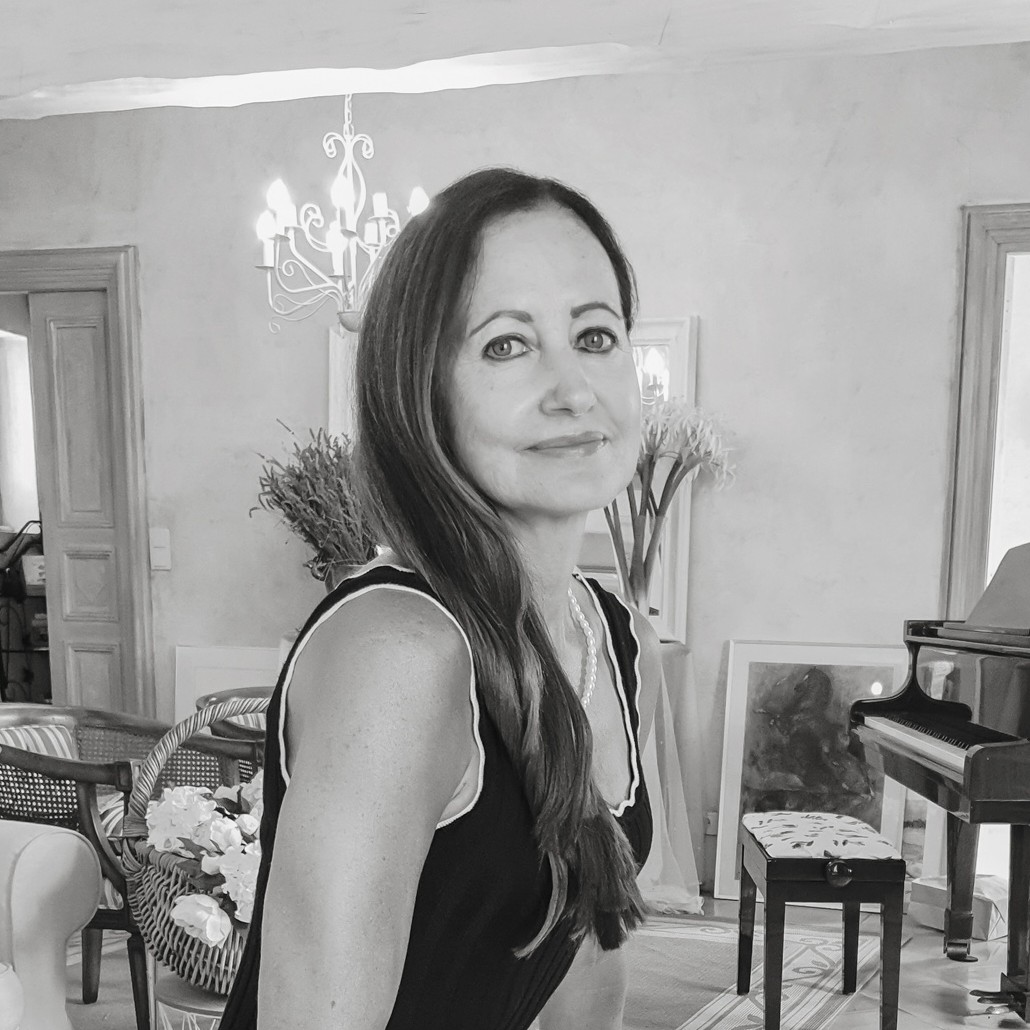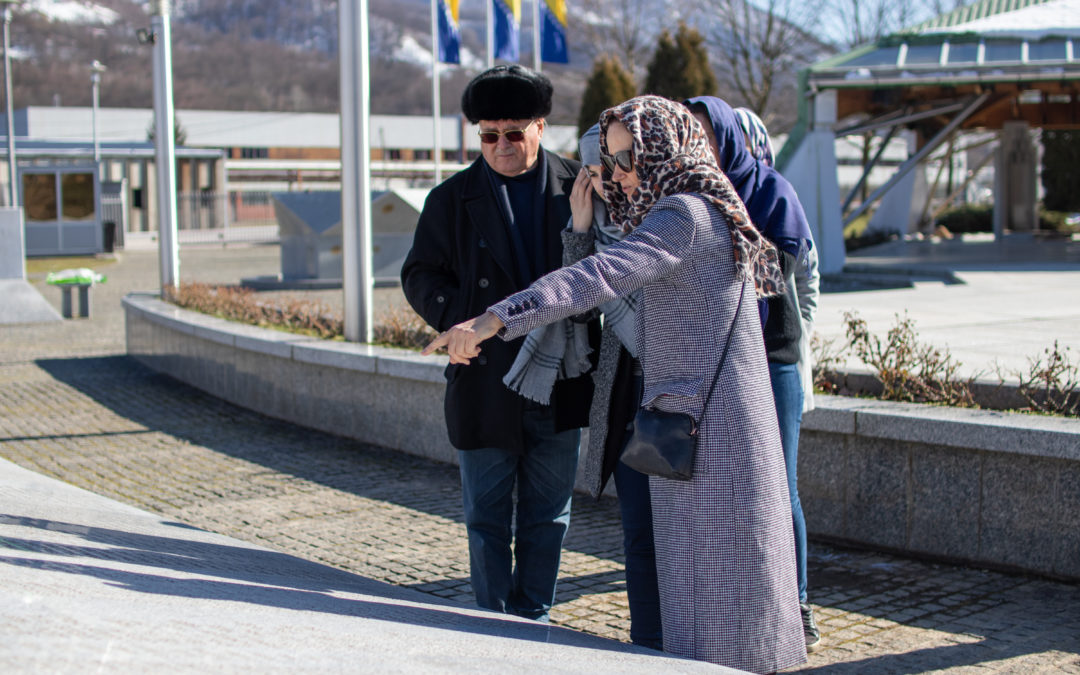Srebrenica, Bosnia and Herzegovina
Sunday, March 13th, 2022
The reflection records Dr Laverick´s emotions on that harrowing day.
Homecoming
I sit cramped in the back seat with Lejla and Sanela. Walter is in the front, and Enver is our driver. He’s a strapping, handsome young Bosnian whose courtesy is a credit to his parents. We tease them both, asking why women always sit in the back when men are in the car. Lejla reminds me of Sanela – not just because of shared experiences as child refugees, but for that searing conviction in the power of reconciliation. This is the first time Sanela has returned to her home village. I cannot imagine how she has prepared for this journey to the past.
The drive from Sarajevo to Srebrenica in the Republika Srpska takes us along winding roads surrounded by dense pine forests. Occasionally small rocks crash to the road, jangling my taut nerves. Shelled homes and bullet-riddled facades are perched on hills, a stark reminder that some families never returned. Was that a child’s bedroom? A living room? Were those books on its walls?
Srebrenica is synonymous with the unspeakable cruelty that occurred in July 1995. Yet it was once Sanela’s home and as we approach the village, I feel the soft aura of her emotion. She asks Enver to turn left. We rattle down a small road and stop in front of a large white rectangular building. While not a ruin, it’s decaying and needs renovation.
This was my school, Sanela says quietly.
We leave the car and crunch along the gravel to the door that once welcomed primary children, both Muslim and Christian. Windows are smashed, but the building is solid, its foundations true. I tap the masonry and fancy it could be rebuilt. Like the country.
Sanela stops in the sunshine, serene and still. Remembering.
We stand back, but she shares some of her memories. Every day she walked to school with her sisters. Five kilometers there, and five back. She points to steep forests beyond the school where once her teachers frantically led them to safety. I try to imagine children scrambling up those hills.
And in these moments, I know that the tragedy of Srebrenica is part of our shared humanity, and our collective duty to ensure it is never repeated. How often do we hear “never again?” I recall seeing a banner hanging between apartments near our hotel in Sarajevo: “Europe: wasn’t it enough? 1992-1995”
It was a statement of solidarity with the people of Ukraine and a grim reminder that what happened in Bosnia is unfolding again. I’m a historian by training but have never subscribed to the notion that history repeats itself. Rather, it’s constantly repeated human behaviours that create tragedies across the historical timeline. Perhaps SANCHILD’s Harmony Project in B&H can break the destructive cycle of human behaviours by encouraging people to understand their differences and find unity in guiding positive change across fractured communities. SANCHILD offers a realistic vision that might ensure another Srebrenica never happens again.
My thoughts are full of this as we return to the car and Sanela’s silent memories envelop us.
We pass lush green meadows where white daisies gaily bob in the breeze. There’s a flowing river, too. Sanela points to an empty field near the water’s edge. This was her home, and next to it, were those of her aunts and uncles.
Bosnians live close to their families, she says fondly.
Now there is nothing for her to touch. No bricks. No foundations. Just the memories.
We reach the genocide memorial. It’s opposite the abandoned UN enclave where thousands sought refuge during that terrible July in 1995. Images of suffering crowd my mind; echoes of grief linger in the air and soon my heart will shatter, like fragile glass. I don’t want to leave the car. It’s such a little step onto the pavement, but sometimes the smallest ones are the most difficult. How can we, who have lived such sheltered lives elsewhere, possibly begin to understand what happened here? Is the offering of compassion and love enough?
There are 6,643 marble obelisks, each engraved with the names of the men and boys who were slaughtered here. Arranged in geometric precision, they extend beyond the treeline. Their tapering white pinnacles flash in ethereal beauty amidst the foliage.
The circular marble memorial is a sanctuary of peace, linking official commemoration to the private grief in the graves beyond its perimeter. We cover our heads with scarves and wander separately, yet together. At one point, Walter has his arm around Lejla. I see them exchange quiet words. Lejla’s foundation has brought harmony and opportunity to Srebrenica, offering schooling and educational development to Bosnian and Serb children alike. Education is a precursor to peace-building and forgiveness.
I gently trace one boy’s record of existence etched in the marble. Sixteen years old.
Enver, who has only known a country at peace, sits in the sun, surrounded by the names of young men who would never reach their twenties, go to university or have families. I recall Walter asking him in the car, “what future do you want for your country?”
“For us to have good jobs. I want to give back to my parents and spend time with my friends and family.”
As I watch Enver, I am reminded of the catalyst for Sanela’s Harmony Project in B&H. A young Bosnian had once pleaded for her help because he didn’t see a safe future in his country. Sanela knows that the cycle of transmitted trauma, from one generation to another, must be broken if this beautiful country is to heal.
I wonder how General Philippe Morillon had felt when testifying at the International Criminal Tribunal for the Former Yugoslavia in The Hague in 2004. As UNPROFOR Commander in 1993, he had assured Srebrenica that the world would never forsake it. I struggle with grief for the lives so brutally ended and grapple with guilt that we, as European observers, allowed this to happen.
Tears stream down my cheeks.
Sanela draws me into her embrace as I grieve for a nation. For Sanela and her family. For Lejla. For Enver.
Then together, we read aloud the words on the marble plaque. It is a mother’s prayer.
May grievance become hope
May revenge become justice
May mothers’ tears become prayers
That Srebrenica never happens again
To no one and nowhere.
About the author

Dr SUSAN LAVERICK
Communication Expert, SANCHILD's Advisory Board Member
Dr Laverick has a Doctorate in English Literature (completed on an Australian government Research Scholarship for scholars of exceptional promise); a Master’s in History from the University of London and is an ICF-qualified executive coach.
She is the founder and director of Susan Laverick Consulting. As a consultant, she works with international corporations, academic institutions, NGOs, teams, and individuals to address critical communication challenges with the aim of developing high-impact communicators. As a seasoned speech-writer and presenter at conferences in Europe, the US and the Middle East, her experience represents an invaluable resource to clients seeking support in the drafting of speeches and the delivery of impactful presentations or pitches. She regularly works with Rotary International, preparing their annual laureates for maiden speeches at the UN in Geneva and New York. She also teaches critical communication skills at both the Graduate Institute of Geneva and the University of Geneva.

